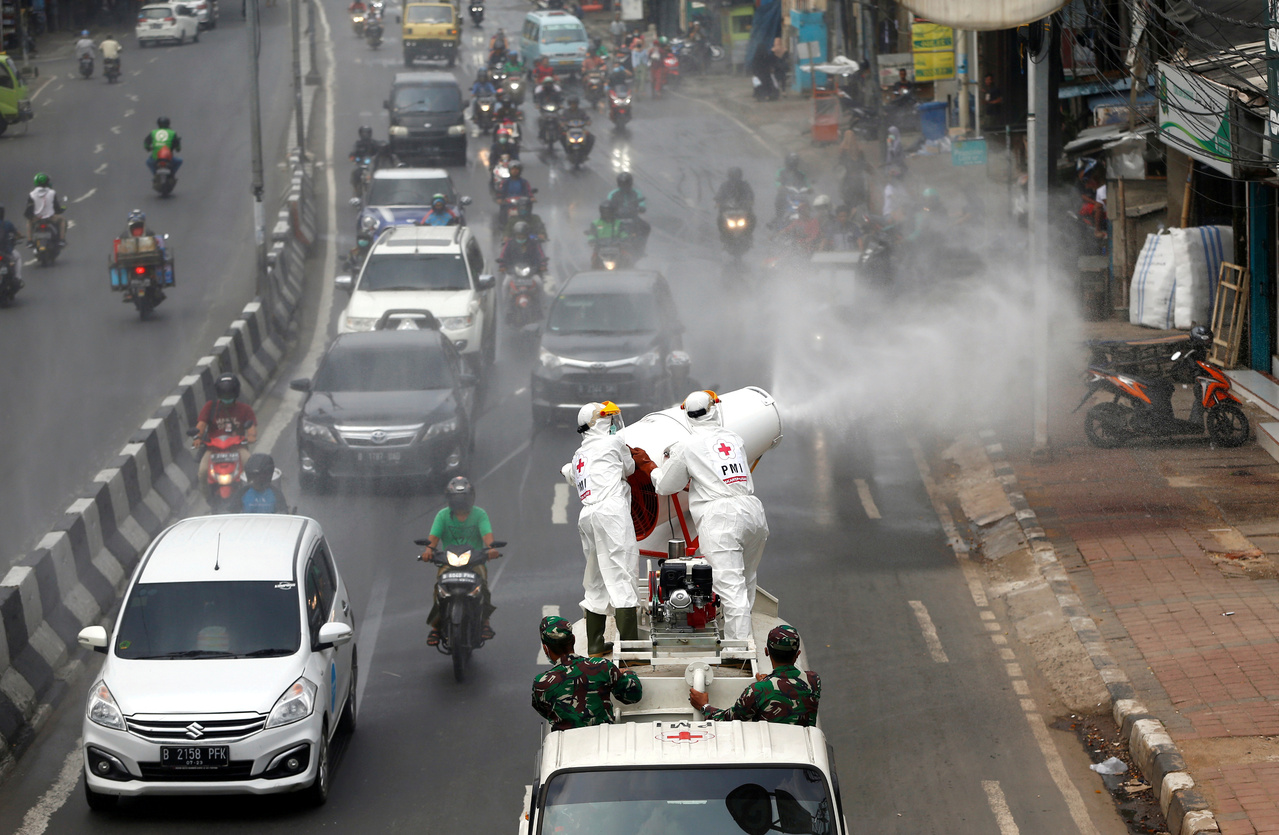Indonesia needs stronger measures to stop domestic movements, says President Jokowi
Sign up now: Get insights on Asia's fast-moving developments

Indonesia's Red Cross personnel spraying disinfectant on a road in Jakarta on March 28, 2020.
PHOTO: REUTERS
JAKARTA - President Joko Widodo on Monday (March 30) said Indonesia needs stronger measures to limit mobility as the government steps up efforts to curb the coronavirus outbreak.
Speaking before a Cabinet meeting, he said thousands of workers in Jakarta and its surrounding areas have returned to their home towns after losing most or all of their income amid the outbreak.
There have been concerns of a spread of infections as people from Jakarta, the epicentre of the country's outbreak, return home, with reports saying Indonesia intends to ban the annual mudik, the home town journey for Hari Raya Idul Fitri, which falls in late May.
Mr Joko's remarks come as Indonesia is preparing to put Jakarta under an "area quarantine", a term observers see as equivalent to a lockdown, to curb the spread of the coronavirus.
The Straits Times understands Mr Joko is also considering a presidential emergency decree that would prevent any current laws from hampering the overall government efforts to tackle the outbreak, as well as institute measures to mitigate the resulting economic crisis.
President Joko said over the past eight days alone, 876 buses had transported about 14,000 people in Greater Jakarta back to their home towns, mostly in West Java, Central Java, Yogyakarta and East Java provinces. Others had taken the trains and ships home, he added.
These are mostly daily-rated workers such as push-cart food sellers, in what is termed the informal sector of the economy.
"The early home town journeys were not due to a cultural reason, but because they were forced to. Many workers in the informal sector experienced a drastic fall in their income, or have even lost all their income," Mr Joko said before the Cabinet meeting.
There are fears that among the thousands of people who have left Greater Jakarta since a state of emergency was declared on March 23, some may be asymptomatic carriers of the coronavirus infection who would spread it to their family and fellow villagers when they reach home.
The concerns about such a spread have also been cited in reports that Indonesia is planning to ban the annual mudik, as the home town journey for Hari Raya is called. Last year's exodus involved some 19.5 million Indonesians, mostly from Greater Jakarta to other parts of Indonesia.
Jakarta is the epicentre of Indonesia's coronavirus crisis, accounting for nearly half of the total 1,414 confirmed cases in the country. There are 122 deaths from Covid-19 in Indonesia, the highest in South-east Asia.
Monday's Cabinet meeting was held to discuss how the government would tackle the home town journeys for Hari Raya Idul Fitri as well as how to mitigate the outbreak's impact on the economy.
Indonesia's leaders have issued several presidential emergency decrees over the years. When a perppu is issued, it becomes effective immediately and is treated as legally binding, circumventing a long legislation process through Parliament.
In July 2017, Mr Joko issued a perppu that allows the government to disband radical organisations. The move was, among other aims, to support the government's decision to ban Hizbut Tahrir Indonesia, on grounds that the Islamist group supports a Muslim caliphate and other activities that deviate from Indonesia's state principle, known as Pancasila.
A year before that, Mr Joko issued a perppu to introduce tougher penalties for child sex offenders, which include chemical castration and the death penalty. The perppu also allowed courts to increase penalties for sex crimes after the media highlighted a growing number of attacks against children.
Then President Megawati Soekarnoputri issued a perppu to accelerate investigation and prosecution of those responsible behind the 2002 Bali bombing that killed more than 200, mostly foreign tourists.
Presidential spokesman Fadjroel Rachman told reporters that the government is also considering an input to declare a state of civil emergency, as stipulated under the 1959 law on the states of emergency. Once a civil emergency is declared, provincial governors have greater powers, among others, to limit residents' mobility within their provinces and to disperse any crowd, that would otherwise be easily challenged under normal conditions.
"It is so that we can ensure an effective large-scale social distancing. But that is our last resort," Mr Fadjroel said.


